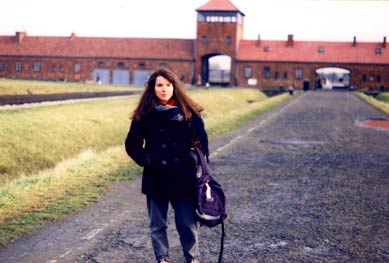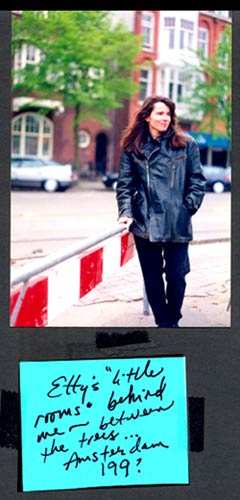|
Love, Etty
The
Journal of Etty
Hillesum
A
One-Woman
Play
Adapted and Performed by
Jane Smith Bernhardt
In
wartime
Amsterdam,
a
mile
from the
secret
annex where
Anne
Frank was
hiding
and
keeping
a
diary
that
became one of
the most powerful
accounts of
the Holocaust,
another
Jewish woman,
Etty
Hillesum,
15
years older
than Anne,
was living in the
open
and
writing a
diary
of
her
own.
Like
Anne,
Etty
refused to
let
the evil blind her
to
love and
beauty.
Soaring above
the
cruelty
and death
around
her,
she
evolved an artistic vision of
almost mystical
intensity.
Etty saw
the ultimate
evil
of
anti-Semitism clearly,
but it
only
strengthened
her
faith.
"God
is
not
accountable
to us for the
senseless
harm
we cause one another,"
she
wrote in her
diary.
''We
are
accountable
to
Him!"
For more
than
a
year,
she
lived
at
the transport
camp
Westerbork, outside
Amsterdam, providing
comfort
to
her people
as
they
waited
for the transports
that
would
take
them East to the death
camps.
During
that
year, she
used
passes
from the Jewish
Council to visit
Amsterdam periodically
and return
to
Westerbork,
shuttling
mail and medicine for the
other
prisoners.
Finally,
on September
7,
1943,
Etty and
her
family boarded a
transport,
and
she
threw
out of
the
train
a postcard
later found
by
farmers.
It read:
''We
have
left
the camp
Singing."
Etty Hillesum
died
at
the
death
camp Auschwitz
on
November
30,
1943.
Her
account of
her life, her love
affair and
her
growing
faith
in God appeared
in two
books
published
in the 1980s: An
Interrupted Life and
Letters from Westerbork.
Now, a Massachusetts-based actress,
Jane
Smith
Bernhardt, has
crafted
Etty's words
into a compelling
one-woman
play,
"Love,
Etty."

Jane Bernhardt
outside the gates of Auschwitz-Berkinau, Poland
Jane Bernhardt
traveled to Auschwitz to perform her piece for the
anniversary of the camps liberation. Jane remembers:
"I was afraid I'd feel overwhelmed in that place, but
standing on the stage-which had been the camp's
induction center-
I felt the light of Etty's passion above and beyond that
ghostly nightmare, still inspiring us to transform our
world."
Aug.14, '94
Dear Friends,
As you know, over the past several years I have faithfully tried to
embody the words and spirit of Etty Hillesum
in my-play ,"Love, Etty: The Journal of
Etty-Hiliesum", which I continue to perform whenever
possible. Etty's words of courage and faith are every
bit as relevant today as they were during the days of
the "Final Solution."
I am writing to you because you have seen the play, or because you know
my dedication to Etty's vision of non-violence in a new
world where:
"Against every new outrage and
every fresh horror, we shall put up one more
piece of love and goodness drawing strength from within ourselves."
Etty died In
Auschwitz in 1943. And I have recently been Invited to
perform "Love, Etty" there this December, as part of the
convocation for "The Interfaith Pilgrimage For Peace And
Life 1995," beginning at Auschwitz and ending in
Hiroshima.
Although the trek to Auschwitz in December is a daunting prospect and I
must provide the funding, I feel very strongly. that
there can hardly be a more fitting occasion for Etty's
words and spirit to be relived:
"I look for the bloody lessons of
these times -
for the new Insight that will be drawn from the deep
well of this darkness and pass
on across the barbed-wire.
I still believe this world will only
be redeemed through love....
It's as if the main path of my life stretches even
now into another world, as if, even now, I were
helping to build a new and different society."
I am asking you to pray for
Etty's vision, for this Peace Pilgrimage, and also for
me - that I will be a vessel for Etty's spirit and a
piece of her answered prayers.
If you would like to make a donation for this trip,
which will cost eight or
nine hundred dollars, I would be deeply grateful.
Thank you, bless
you,
Jane Smith Bernhardt
 |
|
Article published
in Newsday Jan 26, 1996
Interrupted Life
finds Longevity on Stage
by David Behrens
JANE SMITH BERNHARDT had
mixed feelings when she met Etty.Hillesum for the
first time. Etty was so frank about her love
affairs, - her sexual appetites, her devouring
passions.
For Bernhardt, it certainly felt like a real meeting - although Etty
Hillesum was a Dutch Jew who had died in the
Auschwitz extermination camp almost 50years earlier.
Bernhardt's encounter was with a long lost diary just four years ago. She
was at a summer weekend retreat in New England when
a friend had said, "I have something for you," and
mailed her the paperback edition of Etty Hillesum's
journal. The book changed her life.
Hillesum started her diary in March,1941, and continued her entries for
18 months during the early days of the Nazi
occupation of Amsterdam. The diary, and a short
collection of her letters written in1943 from the
Westerbork transport camp in Holland, were published
in the United States for the first time in 1983 and
titled
"An Interrupted Life."
A best-seller in Holland and a text now revered in the international
peace movement, the book is not widely known in this
country, although the 50th anniversary of Hillesum's
death was celebrated two years ago in Washington,
D.C., and there is talk of a film.
Bernhardt, a portrait artist with three children whose husband- is an
Episcopal priest, put aside her paints and charcoals
and worked for almost two years on a one woman play,
selecting sections of the journal to bring Etty
Hillesum and her words to life on stage. Now 43 and
a graduate of the American Academy of Dramatic Arts
in Manhattan, she had not acted professionally since
she started to raise a family.
After performing "Love, Etty: The Journal of Etty Hillesum" on several
dozen occasions at temples, churches, schools and
regional theaters in the Northeast, Bernhardt
presented the work last month during a
reconciliation conference at Auschwitz, bringing
together the offspring of Holocaust survivors and
the offspring of Nazi officers...
Etty Hillesum was 27 when she began her diary, writing at a small
desk in her room overlooking the Museumplein, one of
Amsterdam's historic squares, about a mile from the
home of Anne Frank. They never met: Anne was 15
years younger and had gone into hiding with her
family about the time Etty was completing the
Amsterdam journal.
For Anne, sweet thoughts of first love were just budding. For Etty, life
was a tug of-war between earthy passions and
mystical spirituality.
Her friends had urged her to hide or to join the underground. But she
concluded that there was no escape: If one Jew saves
herself, another dies in her place. Instead,
Hillesum volunteered to serve as a social worker at
Westerbork, where she ministered to other Jews bound
for the death camps. Keeping a chronicle was part of
her search for some meaning in her life.
At first the journal documents her passions: "1 am accomplished in bed,
just about seasoned enough I should think to be
counted among the better lovers," she confides.
She writes about her simultaneous affairs with two men, her voracious
passion for the men in her life, her appetite for
love and art, her wish to understand the
relationship between literature and life.
Hillesum's intense self-absorption was disturbing at first, Bernhardt
recalled in a telephone interview from her home in
Beverly, Mass.
"Etty was so self-centered and hedonistic, so wrapped up in a superficial
layer of existence, it seemed at the start, and I
was losing patience. But at the very same time,"
Bernhardt said, "I felt grateful for her
articulation of the nitty-gritty of life, all the
things many people choose not to write about. . . I
think I felt an affinity for Etty and her way of
chronicling an inner journey - the struggle to
balance spirituality, humanity, intellectual
curiosity, ambition, sexual feelings."
But then the journal begins to change. By the time Hillesum is bound for
Auschwitz, the diary becomes less earthy, and filled
with curious benevolence toward her oppressors. Her
optimistic view, Bernhardt noted, is difficult for
some audiences to accept.
In the final pages, Hillesum concedes that she probably will not live
long enough to become a great artist.
"Very well then," she writes on July 3, 1942, "this new certainty-that
what they are after is our total destruction I
accept it: I know it now and I shall not burden
others with my fears. I shall not be bitter if
others fail to grasp what is happening to the Jews.
I work .and continue to live with the same
conviction and I find life meaningful-yes,
meaningful."
Etty Hillesum's last letter to her friends in Amsterdam was written Sept.
7, 1943, from Westerbork. Two months later, on Nov.
30, according to Red Cross records, Hillesum had
died.
After last month's performance at Auschwitz, Bernhardt recalled, a woman
approached her, very troubled, because her own
parents were among the Dutch Jews who had hid
successfully.
'Was I advocating or celebrating her choice over another?" Bernhardt
said. "Because," the woman said, "if her parents had
made that choice, she would not be alive." No,
Bernhardt said. She was simply' dramatizing one
woman's search for hope.
The performance ends with a long prayer-like recitation:
"Sometimes very late, at night, I find myself walking with a spring in my
step along the barbed wire. Time and again, this
feeling comes into my heart -that life is beautiful
and meaningful and, some day we shall be building a
whole new world. . . If we just care enough, God is
in safe hands with us, despite everything." |
|